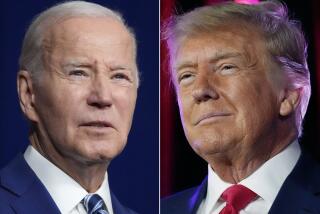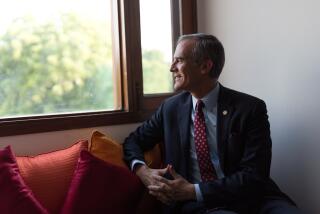A Democratic Dilemma on Pakistan
- Share via
WASHINGTON — President Clinton is approaching a defining moment for his foreign policy, one that could be remembered long after he leaves office.
Within the next week or two, the president will have to decide whether he will stop in Pakistan and meet with its leader, Gen. Pervez Musharraf, when he visits the Indian subcontinent next month.
Musharraf seized power in a coup d’etat last October. Ever since, the Clinton administration and other governments have urged him to set a timetable for new elections and a return to democracy.
The Pakistani leader has rebuffed every request. And so whether the president chooses to see him will say volumes about his administration’s commitment to principles of democracy.
If the president meets with Musharraf and thus helps to legitimate his coup d’etat, that would mark a great irony: On questions of democracy, the Clinton administration will have traversed a path directly opposite that of the Reagan administration.
President Reagan came to the White House apologizing for dictatorships. Through his speeches--inspired by the views of Jeane J. Kirkpatrick, his U.N. ambassador--Reagan argued that the Carter administration had gone too far in pressuring authoritarian regimes to democratize.
Yet surprisingly, during Reagan’s second term, his administration took a series of steps to promote democracy--particularly in the Philippines, where U.S. officials persuaded Ferdinand E. Marcos to give up power, and in South Korea, where they pressured Chun Doo Hwan to open the way for elections.
Clinton, in contrast, took office with a rhetorical commitment to democracy. As one part of his “covenant with America” at the 1992 Democratic National Convention, he promised “an America that will not coddle dictators from Beijing to Baghdad.” (Pakistan, by the way, is situated roughly between Beijing and Baghdad.)
In a few isolated cases over the last eight years, the administration has stood up for democratic principles. For example, it has continued to oppose Myanmar’s military junta, resisting suggestions from Japan and some U.S. firms that the United States should develop a more normal relationship there.
Overall, however, the Clinton administration’s actions have fallen far short of its rhetoric. Now, the Pakistan decision looms as a symbolic test of Clinton’s legacy.
The arguments being advanced in favor of Clinton’s meeting with Musharraf essentially boil down to two.
The first is that if Clinton doesn’t stop in Pakistan, he will cause that country to come unhinged. Pakistan--the argument goes--might drift toward greater support for Islamic fundamentalism; anti-American elements would gain ground; and Pakistan might reduce its support for American efforts against terrorism.
The problem with such arguments is that they overstate the importance of a presidential visit. A single Clinton meeting with Musharraf isn’t going to decide the future of Pakistan. Larger forces are at work.
“It’s phenomenal hubris to believe that 10 minutes of a president’s time sitting down at the Islamabad airport will be the key to Pakistan’s future integrity,” says Paula Newberg, author of a book on Pakistan’s political system. “These issues are not just about the United States.”
On the other hand, Clinton’s decision about meeting Musharraf will show how the recent coup and Pakistan’s long history of military regimes square with American values and democratic ideals.
The second argument is that it would somehow be wrong for the American president to go to India and not Pakistan. By this theory, U.S. foreign policy should treat these two old adversaries evenhandedly.
Musharraf is pushing this argument. Lobbying this month for a Clinton visit, he said he hoped the United States would show a “positive and uniform attitude” in dealing with South Asia.
But India and Pakistan are not uniform: not in their political systems, since India is the world’s largest democracy; and not in their strategic importance to the U.S. either, since India is emerging as one of the powers of the 21st century.
For the last few years, Clinton administration officials have been insisting that U.S. foreign policy no longer saw India exclusively through the lens of its rivalry with Pakistan. Rather, it was said, India was being viewed for its larger importance in Asia and the rest of the world.
Yet by visiting both Pakistan and India, the United States would fall back into the old habit of linking the two countries, and thus undermine its attempt to develop a new relationship with India.
Several administration officials say that even if Clinton does stop in Pakistan, India will still be treated as “the main show” of the presidential trip.
A meeting with the recent leader of a military coup, however, could turn the trip into a three-ring circus. And it would raise anew the question of whatever happened to Clinton’s commitment to promoting democracy.
Jim Mann’s column appears in this space every Wednesday.
More to Read
Sign up for Essential California
The most important California stories and recommendations in your inbox every morning.
You may occasionally receive promotional content from the Los Angeles Times.










